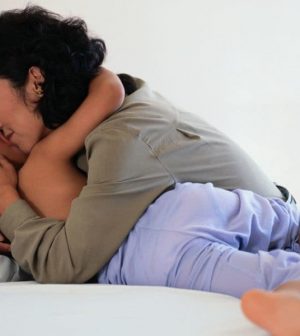- Could Your Grocery Store Meat Be Causing Recurring UTIs?
- Are You Making This Expensive Thermostat Error This Winter?
- Recognizing the Signs of Hypothyroidism
- 10 Strategies to Overcome Insomnia
- Could Artificial Sweeteners Be Aging the Brain Faster?
- Techniques for Soothing Your Nervous System
- Does the Water in Your House Smell Funny? Here’s Why
- Can a Daily Dose of Apple Cider Vinegar Actually Aid Weight Loss?
- 6 Health Beverages That Can Actually Spike Your Blood Sugar
- Treatment Options for Social Anxiety Disorder
How to Reassure Kids When Florence Strikes

Adults have spent a lifetime hearing about or experiencing natural disasters such as Hurricane Florence, which is targeting the Carolinas this week.
But how to explain to kids the dangers of these events, without unduly scaring them?
The key, said child psychiatrist Dr. Victor Fornari, is to lead by example.
“Parents need to remain calm and model reassurance,” said Fornari, who directs child and adolescent psychiatry at Zucker Hillside Hospital in Glen Oaks, N.Y.
Certainly, he said, “parents need to avoid becoming hysterical and be mindful of what they say.Sometimes, in the face of anxiety, parents may say terrifying things that frighten children.”
Expected to make landfall somewhere near the border between North Carolina and South Carolina early Friday, Florence is expected to be a category 2 hurricane when she hits. Her winds have weakened slightly, dropping to 110 miles per hour, but weather experts still think she could dump catastrophic amounts of rain on coastal and inland areas.
Many people in the two states were already on the move ahead of the storm.
Fornari said that the number one concern for parents should be to “take action in order to insure safety and protect their children from harm.”
If that means evacuation, so be it, and if homes are so damaged or inaccessible that a speedy return isn’t feasible, all that needs to be calmly explained to kids.
“If massive upheaval does occur, parents need to reassure their children that they will recover and be fine,” Fornari said. “Temporarily residing in a shelter or in temporary housing can be very disruptive, but [kids need to know that] it is temporary and will be resolved.”
Even after the storm has passed, parents should stay “calm and action-oriented” to care for a child’s physical and emotional needs, the psychiatrist added. That means steady, loving reassurance when kids are stressed.
Other disruptions — the temporary loss of a beloved pet, for example — could combine to put a child into what Fornari called a “natural regression.”
“Parents need to be sensitive to the natural regression that may occur and listen to their children,” he said.
And families shouldn’t be shy about asking for help for any mental health issue that does arise, Fornari added.
“Psychological first aid can be very helpful in the immediate aftermath of a disaster,” he said. “Trained counselors at shelters can provide this important, evidence-informed care.”
More information
Visit the U.S. Centers for Disease Control and Prevention for more on hurricane preparedness.
Source: HealthDay
Copyright © 2026 HealthDay. All rights reserved.










